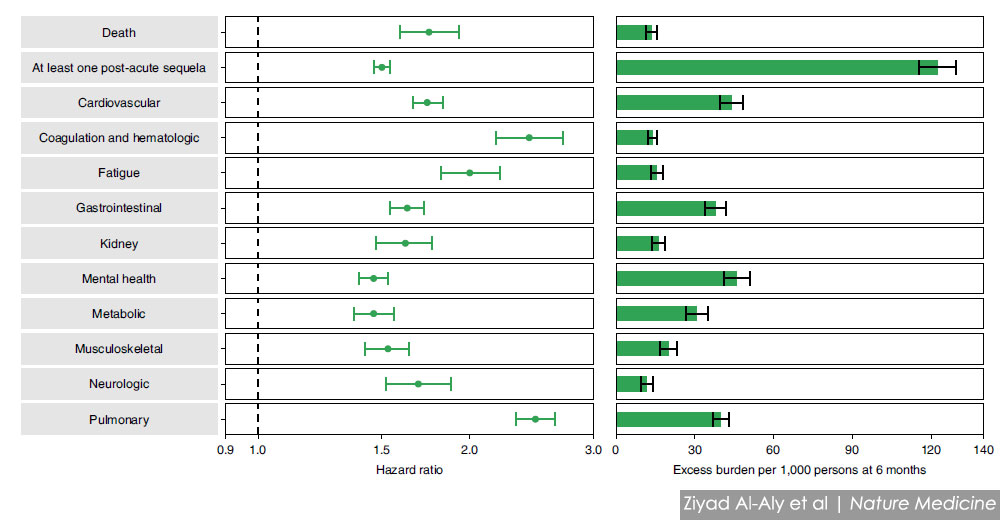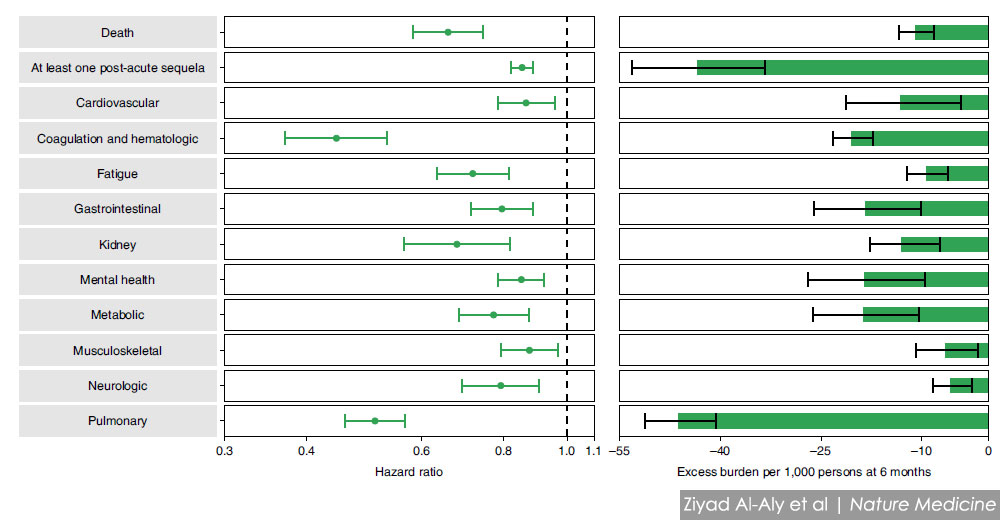A large study has linked Covid-19 vaccination to only a modest reduction in the risk of Long Covid symptoms following a breakthrough infection, including the risk of death in the months after recovering from the initial infection.
Researchers involved in the study warned that this meant relying on vaccination alone to defend against Covid-19 will not be enough to mitigate the disease’s long-term consequences.
Additional measures will be needed, such as preventing such infections from occurring in the first place.
“These results show that, although vaccination may partially reduce the risks of post-acute death and disease, to most optimally reduce this burden requires a continued emphasis on primary prevention of breakthrough SARS-CoV-2 infection as a goal of public health policy.
“Although the absolute rates are smaller than in those with SARS-CoV-2 infection without prior vaccination, given the scale of the pandemic and the potential for breakthrough cases to continue to accumulate, the overall burden of death and disease after breakthrough infections will likely be substantial, and will further add to the toll of this pandemic and will represent an additional strain on already overwhelmed health systems.
“In planning and development of health resources, governments and health systems should take into account the care needs of people with post-acute sequelae after breakthrough infections,” the study’s authors wrote.
Prevention still the best method
Breakthrough infections refer to Covid-19 infections that occur despite being fully vaccinated.
The study was published in the journal Nature Medicine on May 25.
While most Covid-19 patients would fully recover, some patients still have lingering symptoms that last months or years past the initial infection.
The latest study is the largest yet on the question of whether vaccines can reduce the occurrence of Long Covid symptoms following a Covid-19 infection.
To do this, the team analysed the US Department of Veteran Affairs’ health database and found 33,940 individuals who were fully vaccinated and then had a Covid-19 infection between Jan 1, 2021 and Oct 31, 2021, and had survived the first 30 days of the infection.
They were followed up six months after the infection and were compared against millions of other patients in the database, accounting for differences in factors such as age, race, pre-existing medical conditions, and hospital occupancy rates.
The study did not look into the effects of booster shots, nor the Omicron variant that emerged after the study period.
The researchers found that for every 1,000 unvaccinated people who survived the first 30 days of their Covid-19 infection, 32.49 of them were dead by the end of the six-month follow-up period.
In comparison, the death rate among vaccinated people is lower at 21.50 deaths per 1,000 breakthrough infections after six months. However, the death rate for people with no known Covid-19 infections is even lower at 8.14 deaths per 1,000 people.
In other words, despite vaccination, there were still 13.36 extra deaths linked to Long Covid among people in the study for every 1,000 of them infected with Covid-19.

For context, there are over 4.4 million Covid-19 survivors in Malaysia according to the official tally, including those with or without prior vaccination.
To be sure, the researchers also compared patients with breakthrough Covid-19 infections against other types of patients, such as those who were vaccinated against Covid-19 but did not become infected, those who received non-Covid treatment in the healthcare system before the pandemic (instead of during the pandemic), or those who were hospitalised for seasonal flu instead of Covid-19.
They consistently found that Covid-19 infection is linked to higher death rates and symptoms associated with Long Covid. Vaccination reduced some of these risks but did not eliminate it.
In the comparison between patients hospitalised for a breakthrough Covid-19 infection against those who had been hospitalised for seasonal influenza before the pandemic, they found that the Covid-19 survivors died at double the rate compared to their influenza counterparts after six months.
This amounted to 43.58 extra deaths for every 1,000 people hospitalised for breakthrough Covid-19 infection. The rates for symptoms associated with Long Covid are also higher for those hospitalised for Covid-19 rather than influenza.
The study also found that vaccination is linked to a reduction in some Long Covid symptoms (shortness of breath, anxiety, anaemia, etc), but not others such as stroke, diabetes, and heart failure.
Overall, after differences between different types of patients are accounted for, vaccines are linked to a 34 percent reduction in the risk of Long Covid deaths and 15 percent reduction in the risk of developing at least one Long Covid symptom.

The study did not look at the severity of those symptoms, such as whether the symptoms posed a hindrance to the Covid-19 survivors’ daily lives.
Previously on May 10, the Health Ministry said 65.1 percent of Covid-19 survivors who were in Category 4 or 5 during their initial infection have at least one Long Covid symptom, while 61.2 percent have at least two symptoms.
As of April, 9,230 of them have received either inpatient or outpatient rehabilitative treatment for Long Covid. About 30 to 40 percent of them were able to return to work after three months, and 60 to 70 percent after six months.
Category 4 patients refer those who required supplementary oxygen to breathe, while Category 5 patients are critically ill and typically need to be intubated.
However, experts have warned that the focus on survivors of severe Covid-19 cases could lead to Long Covid being under-reported in Malaysia.
According to a report by the health news portal CodeBlue, University of Malaya epidemiologist Dr Moy Foong Ming estimated that between 10 to 20 percent of Covid-19 survivors in Malaysia experienced Long Covid. This translates to about 448,000 and 896,000 people nationwide.
On May 1, the Health Ministry added a new MySejahtera module to survey Covid-19 survivors about their Long Covid experiences. - Mkini




No comments:
Post a Comment
Note: Only a member of this blog may post a comment.